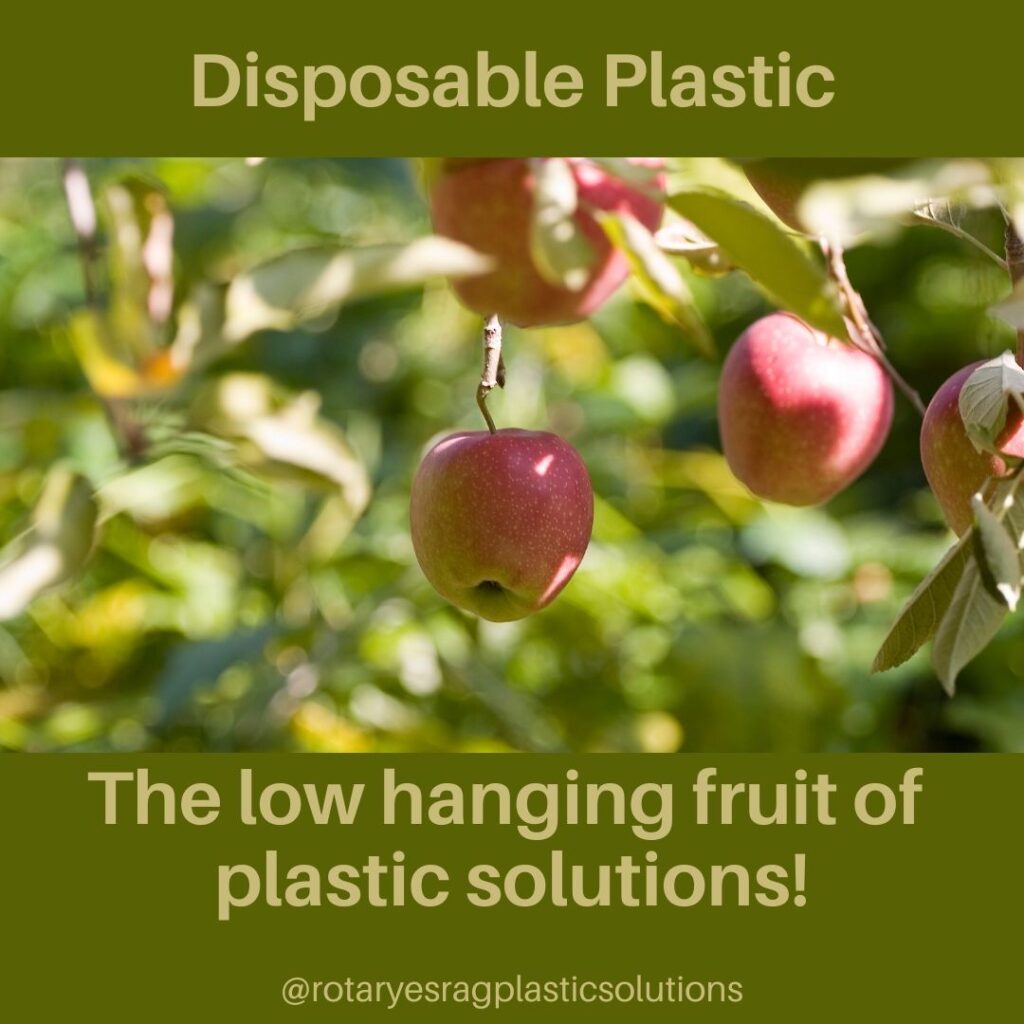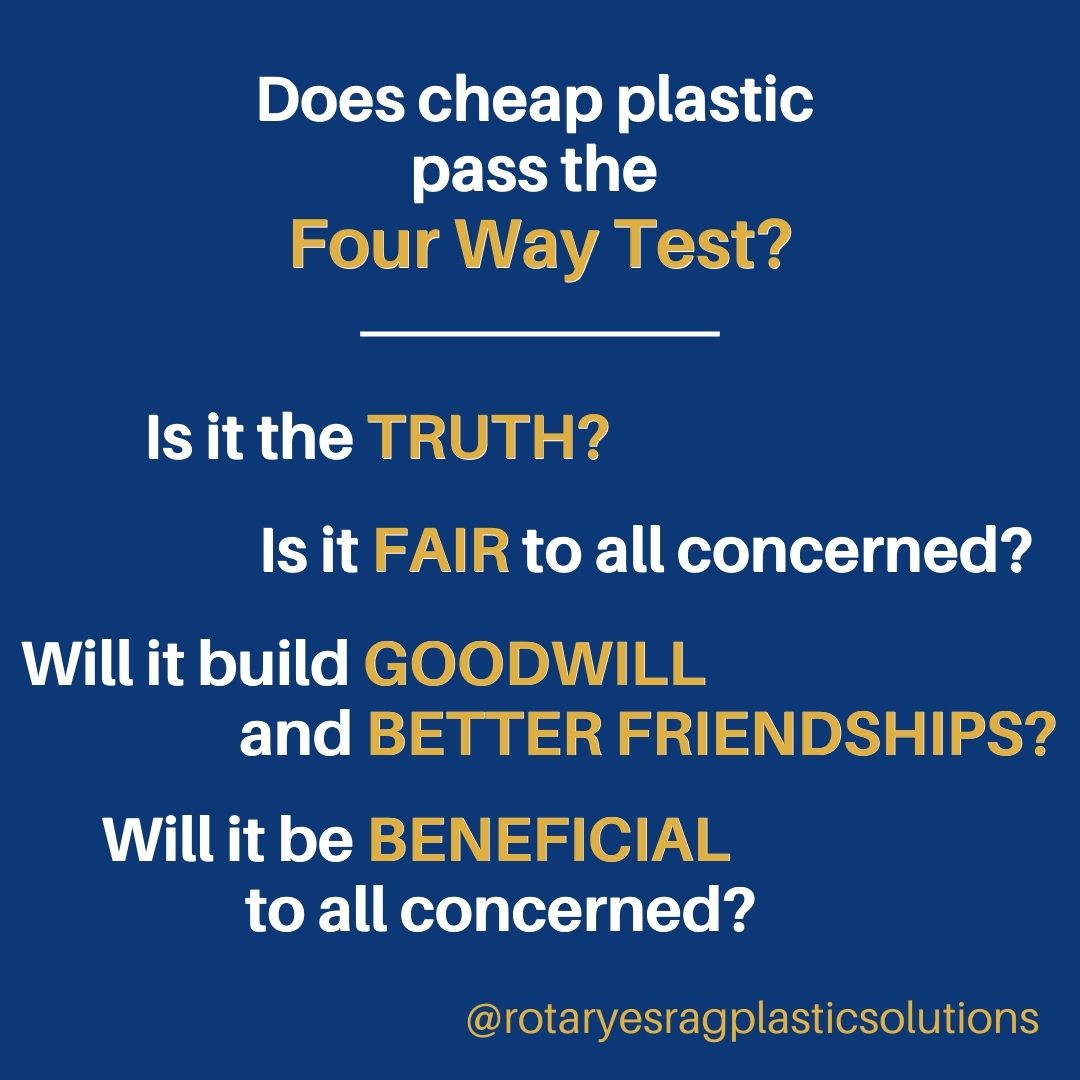By Ariel Miller, ESRAG Newsletter Editor
Finding a Path to Plastic Solutions
Shining the Four Way Test as a surgical light, ESRAG’s Plastics Solutions Task Force is illuminating ways for the family of Rotary to act most effectively to reduce the world’s massive plastic crisis. Through monthly Global Plastic Cafe discussions on Zoom, blog posts, and networking, they are pooling their knowledge to document the enormity and complexity of the problem. Rotarians must be equipped to help their communities overcome the dangerous gaps in public awareness. Equally crucial: Task Force members are striving to identify solutions that best meet the standards of being fair and beneficial to all.

Low hanging fruit of plastic solutions
“People have some awareness of the environmental impact of plastic litter because they can see it. But it’s the medical aspects that are particularly deserving of a bullhorn, especially on behalf of children,” says Task Force Chair Tami Mulcahy. “What people can’t see is the tiny microplastics, nano plastics and nanoparticulate that enter our bodies simply because we are surrounded by plastic. Researchers are finding these in women’s breast milk, placentas and the sperm of men.” She cites US National Institute of Health warnings that chemical additives used to make plastic can affect fetal development. And, the American Society of Endocrinology states that many chemicals used to make plastic are endocrine disruptors that affect our hormonal system.
The Task Force is catalyzing discussions among Rotarian engineers, doctors, ecologists, and teachers to map the life cycle of plastics across the world, including the many circular economy projects that are springing up, particularly in developing countries. For example, Mulcahy asks, “In the Nakivale Refugee Settlement in Uganda, there are women melting plastic in pots to make products. There is equipment that can make this toxic process safer. But what other safeguards need to be put in place? What about toxic dust from plastic chipping machines and melting down plastic to pave paths where barefoot children walk? We don’t want to be kicking ourselves in ten years for producing something that makes a kid sick.”
Ensuring Environmental and Human Safety Before Taking Action
Mulcahy offers more examples of questions Task Force members ask to ensure “solutions” aren’t creating serious new harms.
- How environmentally safe are sea water projects that use PVC pipe? Is the water that runs through PVC safe for human consumption?
- If we’re adding sachet trash to eco-bricks, what is their weight-bearing load?
- What is the load bearing of plastic poles for building houses?
- If mixed plastic is pressed into boards the size of sheetrock, what about off-gassing, especially in hot climates?
Rotarians need to look very carefully before they leap into supporting recycling schemes that look at first blush like a glorious combination of jobs for the poor, reducing solid waste, and making useful products.
The mission of the Plastics Solutions Task Force is to get answers, weigh the facts and provide toolkits for Rotarians to discover what they can do to protect both human health and the ecosystems we share with other living things. Mulcahy sees three powerful strategies that Rotarians are well-positioned to implement:
- Promote solutions that reduce pollution AND minimize adverse impacts.
- Set a powerful example for the communities we influence.
- Drastically reduce consumption of single-use/unnecessary plastics.
“‘Unnecessary plastic’ is the new synonym for single-use plastics. This helps separate ‘necessary’ plastic from the conversation, such as medical devices, car seats, and bike helmets,” says Mulcahy. “Petrochemical companies will grow the fear-marketing campaigns, like the ad we saw during the Super Bowl on how hospitals and lives depend on plastic and gas. Necessary plastics are not our focus. The unnecessary plastics are.”
From Ocean Lover to Global Advocate

Tami Mulcahy performing a concert to inspire people to tackle the plastic crisis, and ESRAG Plastic Free Task Force Instagram posts
Rotarians arrive at this work by many paths: Mulcahy lives in Los Altos, in the San Francisco Bay area of Northern California. It is her lifelong love of the ocean that transformed her into a passionate advocate against plastic pollution. “The ocean is my happy place and I wanted to make a difference,” she says. A former physical therapist and active songwriter, she composed “Part of the Solution,” which was sent “unbeknownst to me,” to renowned environmentalist Bill McKibben. He posted this comment: “It’s a lovely song, and you sing it beautifully. Thanks for, well, being part of the solution!”
Though she’s already leading an international Rotary Action Group task force, she’s a brand-new member of the Rotary Club of Los Altos – “still a red badger,” she says. “I came to Rotary through ESRAG because I have two good friends who are movers and shakers. I told them my concern about plastics, and they dropped me direct deposit into ESRAG.”
She soon found herself volunteering more than full time as Chair of ESRAG’s Task Force, mentored by and succeeding the incredible Lori Cloutier, whose husband Mike Cloutier, also one of ESRAG’s outstanding leaders, died tragically in 2023.
Mulcahy is now facilitating monthly meetings of the Global Plastic Café, where Rotarians from all over the world brainstorm and share a wealth of experience. The August, 2024 meeting focused on the opportunities and risks of circular economy projects, especially those employing low-wage workers in settings with inadequate occupational safety. Indian engineer Neeraj Bhatnagar presented charts on plastic recycling and reuse strategies around the world, listing pros and cons of each technical approach. He is ready to help clubs come up with ethical, safe, and cost-effective solutions to specific solid waste streams.
Aruna Varsani, a Montessori school director in Kenya, also runs a recycling business and described multiple challenges, particularly with plastic products made of more than one material. From a business point of view, “waste collection that mixes all the many types of plastic together requires many extra steps in recycling. Every necessary step in recycling adds costs and postpones any income,” she said. Recycling plastic “is very expensive” when you uncover the hidden costs.
Rotarian Howard Homler, an internal medicine physician, writes for the Plastic Solutions newsletter. He offered to share a flyer he is compiling on protecting children and athletes. Many participants chimed in with links and resources. Children and education toolsets are a priority.
For those who want a deep immersion into the plastic problem, Mulcahy recommends the formal training provided by Beyond Plastics of Bennington College. “Plastic is their absolute focus,” she explains. “At the very least, attend the Beyond Plastics seminars – they are incredible.” And they are free, along with ESRAG seminars on topics such as solar cooking, water sanitation, food insecurity…all the many layers that interweave with the plastic crisis.”
Since recycling is fraught with so many problems, the top priority is to reduce our consumption of plastics in the first place – what Mulcahy calls “turning off the tap.”
Drastically reduce consumption of single-use plastics. “There is nothing about single-use plastic that passes the Four Way Test. We need Rotary International to be proactive,” says Mulcahy. “Tell every District and Club to eliminate single-use plastics from Rotary meetings and events: no turning back. This is the low-hanging fruit.”
Promote solutions that minimize adverse impacts: Outsourcing our plastic is not a solution. For Mulcahy, the textbook case of plastic environmental injustice is shipping plastic waste from rich countries to developing nations. “This is waste colonialism,” she says. “Plastic is being wrapped in cardboard and smuggled into places like Indonesia on container ships. What can’t be sold or used is dumped or incinerated in villages, fouling the soil and air with no recourse. It begs the question:
If we know that there’s a worldwide shortage of waste management facilities, why do we ship our plastic goods and waste to places with little to no infrastructure? It only feeds the out-of-sight, out-of-mind mentality that our plastic usage is OK because it is appropriately managed. It’s not! And there is ethical urgency for everyone to grasp the full dark picture of plastic waste.”
Promote solutions that maximize impact. An ounce of prevention is worth a pound of cure. Tons of ocean plastic come from inland sources. Every Rotary club can invest in regular clean-ups of the local watershed. Cleanups are fun. They build community. But, “just remember that no clean up is complete without looking upstream to find the source of the problem,” Mulcahy says. “Then work with those upstream communities and industries.” Central American Rotarians’ work to prevent solid waste from clogging the Río Motagua and the beaches at its mouth is an example of how to build a solution of lasting value.
ESRAG Plastic Solutions is partnering with Open Ocean Global to map plastic-fouled beaches and teach people working on clean-ups to look upstream.
Set a powerful example for the communities we influence. “People in businesses, hospitals, and places of worship are looking to go plastic-free. Rotary has an incredible opportunity to be on the forefront and should be on the forefront especially to engage young people who consider the environment a top priority,” Mulcahy points out.
The Plastic Solutions Task Force blog, community presentations and Plastics Café discussions offer a wealth of alternatives that Rotarians are promoting in their communities, including lending libraries of cutlery and plates, organizing restaurants and soup kitchens to use carry-out containers that can be returned, cleaned, and reused, providing metal water bottles and refilling stations, and encouraging businesses to start offering refills for containers of consumer products like shampoo.
As for those plastic ‘water’ bottles, Mulcahy says, “please eliminate the word ‘water’. We need to protect our kids from the microplastics and chemicals in plastic bottles, period. I want everyone to start working with schools and sports teams to educate students and athletes.” Think of metal bottles with your club’s logo, demonstrating Rotarians care for the health of young people and the planet they must live on.

